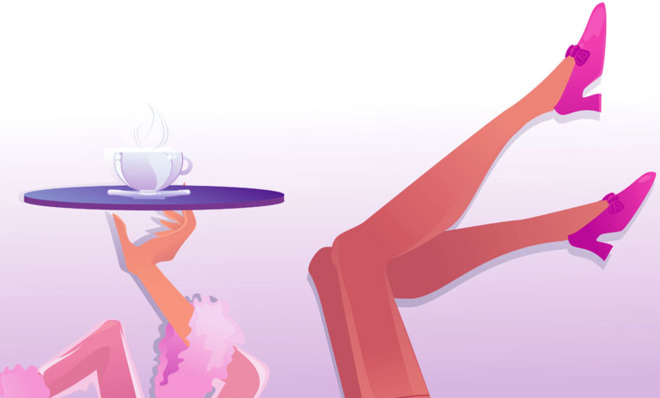Will prostitution go the way of marijuana reform?
With demand comes supply

A free daily email with the biggest news stories of the day – and the best features from TheWeek.com
You are now subscribed
Your newsletter sign-up was successful
Carmela Panico, the owner of Java Juggs, a Seattle-based chain of risqué coffee shacks, has pleaded guilty to felony charges of fraud and promoting prostitution. As the proprietor of the chain and the alleged manager of baristas turned prostitutes, she profited from shops that "offered caffeine and sex acts and earned hundreds of thousands of dollars in tips for her baristas," according to Reuters.
It was a popular — and, indeed, highly lucrative — business. As Reuters points out, "some baristas made between $15,000 and $30,000 in a month and one reportedly earned $89,000 in a single month, the charging documents alleged."
How did they make that money? Some of it was allegedly made from stripping: "Customers would typically pay a barista $20 — $6 for a coffee plus $14 to expose her breasts or bottom." But other charges were more serious: Panico and her customers would also "have sexual contact with some of their customers," according to an affidavit.
The Week
Escape your echo chamber. Get the facts behind the news, plus analysis from multiple perspectives.

Sign up for The Week's Free Newsletters
From our morning news briefing to a weekly Good News Newsletter, get the best of The Week delivered directly to your inbox.
From our morning news briefing to a weekly Good News Newsletter, get the best of The Week delivered directly to your inbox.
Prostitution is obviously illegal in Washington, as it is in all but a few counties of Nevada. Clearly, by promoting prostitution these shacks were breaking the law. But setting aside the law (which can be changed), what's the harm?
Two consenting adults decide to make a mutually beneficial trade, cash for sexual favors (and some coffee). Just as long as nobody has been forced into it against his or her will, should we really be locking up people for economic choices they enter into freely and consensually?
I hear you. You're asking what I would think if I had a daughter trading sexual favors for cash at Java Juggs. Well, I would strongly discourage her from doing it. But I wouldn't want the force of the law to come down on her. Isn't it possible to disapprove of activities without resorting to locking people up and criminalizing a whole sector of the economy?
After all, the demand for these kinds of services is huge. Fifteen percent of all American men have paid for sex, and 30 percent of single men over age 30 have paid for sex. And as Dennis Hof — the owner of Nevada's Moonlight Bunny Ranch brothel — points out, even in its current illegal state "[t]he prostitution industry in America is about an $18 billion business."
A free daily email with the biggest news stories of the day – and the best features from TheWeek.com
But the federal government sees none of that money. Instead of taxing these activities and regulating them to make the business safer for sex workers and their clients — as it is in the counties of Nevada where prostitution is legal — we spend money on imprisoning people whose crime is to offend other people's moral sensibilities.
As Cornell law professor Sherry Colb argues:
Prostitution should not be a crime. Prostitutes are not committing an inherently harmful act. While the spread of disease and other detriments are possible in the practice of prostitution, criminalization is a sure way of exacerbating rather than addressing such effects. [ProCon.org]
Recent studies show that decriminalizing prostitution confers significant benefits. Rhode Island accidentally decriminalized indoor prostitution between 2003 and 2009, and incidences of forcible rape and cases of the sexually-transmitted disease gonhorroea both fell. Another study, as Slate's Reihan Salam points out, also found that decriminalizing prostitution could help reduce the spread of HIV.
And after Germany and New Zealand legalized sex work, violence against sex workers decreased.
So is legalization a real prospect on the horizon? After all, the movement to legalize another vice, marijuana, has notched notable successes across the U.S. recently.
Though 58 percent of Americans according to Gallup now favor legalizing marijuana, only 38 percent of Americans favor legalized sex work.
Still, 38 percent is by no means insubstantial. And like polling on marijuana, opinions have changed a lot over the years. A 1971 Harris poll found that just 14 percent of Americans thought prostitution should be legal, compared with the 86 percent who thought it should be a crime. That was actually a higher level of support than legalizing marijuana received two years earlier. In 1969, a Gallup poll found that 12 percent supported legalizing marijuana, with 84 percent opposed.
Legalizing marijuana and prostitution actually were on the same level polling-wise into the '90s, too. In 1995, a Social Science Research Center poll found that just 19 percent thought prostitution should be legal, compared with 81 percent who thought it should be a crime. Similarly, legalizing marijuana hovered in the 20-percent range for most of the '90s. It was only in 2009 that legalizing marijuana crossed the 40 percent mark.
The similar trend lines alone lead me to believe that sex work including ventures such as Java Juggs could be legalized in some states in the not-too-distant future — especially if a well-funded campaign gets involved.
John Aziz is the economics and business correspondent at TheWeek.com. He is also an associate editor at Pieria.co.uk. Previously his work has appeared on Business Insider, Zero Hedge, and Noahpinion.